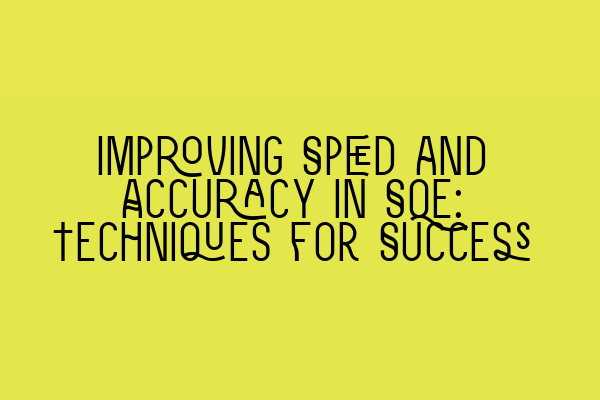Improving Speed and Accuracy in SQE: Techniques for Success
Are you preparing for the SQE exams? If so, it’s crucial to focus on improving both your speed and accuracy. The Solicitors Qualifying Examination (SQE) is a challenging assessment that evaluates your knowledge and skills in various areas of law. By enhancing your speed and accuracy, you can confidently tackle the exam questions and maximize your chances of success.
In this article, we will explore effective techniques to help you improve your speed and accuracy in SQE. These strategies will enable you to optimize your study time, increase your efficiency, and perform at your best during the exam. Let’s dive in!
1. Develop a Study Schedule
A well-structured study schedule is essential for a disciplined approach to exam preparation. Allocate specific time slots for different subjects, ensuring that you cover all the necessary areas within the available time. By sticking to your schedule, you can effectively manage your time and maximize productivity.
As you create your study plan, consider utilizing online resources such as Tenant Rights in the UK: Understanding Your Legal Protections and Legal Considerations in Residential Leases: Essential Insights for Solicitors. These articles provide valuable insights into specific legal topics related to property law, which is an important area covered in the SQE.
2. Practice with Mock Exams
Mock exams are invaluable tools for improving speed and accuracy. These practice tests simulate the actual exam conditions, allowing you to familiarize yourself with the format and time constraints. By regularly practicing with mock exams, you can work on your time management skills, identify areas of weakness, and refine your approach to answering questions.
Consider participating in workshops such as Workshops on Land Law: Hands-On Training for Effective Practice. Such workshops provide hands-on training, including mock exams and expert guidance, to help you develop effective strategies and gain confidence in tackling property law-related questions.
3. Master Exam Techniques
When it comes to the SQE exams, it’s essential to understand the exam techniques that can help you save time and improve accuracy. These techniques include:
- Skim-Read: Start by quickly reading through the entire question paper to get an overview of the topics and allocate time accordingly.
- Focus on Keywords: Pay attention to keywords in the questions, as they provide clues about what the examiners are looking for in your answer.
- Outline Your Answers: Before diving into writing, spend a few moments outlining the structure of your answer. This will help you stay organized and ensure all relevant points are covered.
- Use Bullet Points: If appropriate, utilize bullet points to present your answers concisely and save time on writing lengthy paragraphs.
- Proofread: Allocate a few minutes at the end of the exam to review and proofread your answers for any errors or omissions.
4. Time Management Techniques
Time management is crucial during the SQE exams. Here are some techniques to help you make the most of your allocated time:
- Read Instructions Carefully: By understanding the instructions clearly, you can efficiently navigate through the exam and avoid unnecessary mistakes.
- Allocate Time per Question: Divide your time based on the number of questions and their respective weights. This ensures that you allocate sufficient time for each question, preventing rushing or spending too much time on a single question.
- Don’t Get Stuck: If you encounter a challenging question, don’t dwell on it for too long. Move on to the next question and come back to it later if time permits.
- Manage Your Breaks: If the exam allows breaks, plan them strategically. A short break can refresh your mind and improve your focus during the exam.
For a comprehensive understanding of property law-related topics, explore resources such as Lease Laws in the UK: Unraveling the Legal Framework for Tenants and Differences Between Commercial and Residential Property Laws: Examining Contrasting Regulations. These articles delve into specific aspects of property law, providing essential insights for solicitors.
5. Improve Reading Speed
Improving reading speed can significantly enhance your overall speed and accuracy in the SQE exams. Here are some strategies to help you read more efficiently:
- Skim through Text: Practice skimming through text to quickly identify key information and grasp the main points.
- Eliminate Subvocalization: Subvocalization refers to silently pronouncing words as you read. Minimize this habit to increase your reading speed.
- Use Peripheral Vision: Train your peripheral vision to capture more words per line, allowing you to read faster.
- Practice Speed Reading: Consider using speed reading techniques and tools to enhance your reading speed and comprehension.
By incorporating these techniques into your study routine, you can gradually improve your speed and accuracy in tackling the SQE exams. Remember to maintain a positive mindset and stay consistent in your efforts. Practice, review, and refine your approach to optimize your performance on exam day.
Best of luck with your SQE preparation!

Leave a Reply